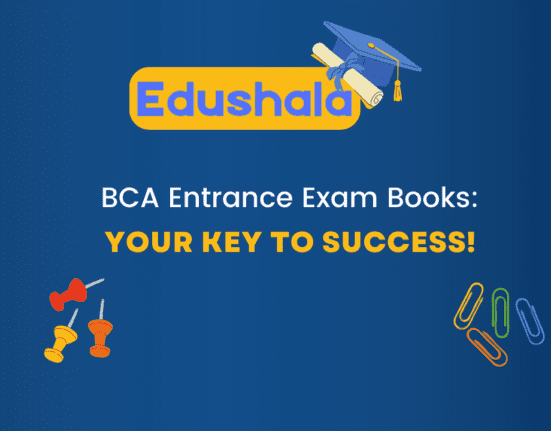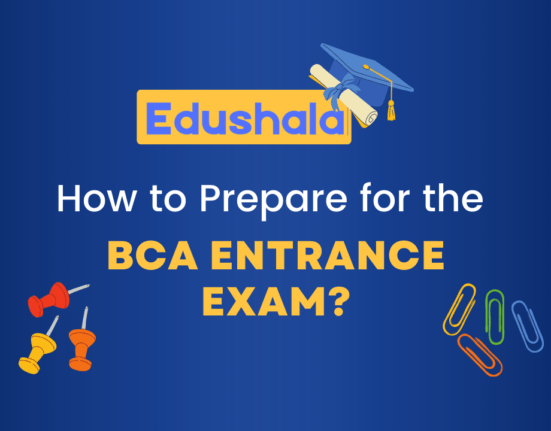Are You Planning on Pursuing a Bachelor of Computer Applications (BCA) Degree? Navigating Entrance Exams Can Be Scary but knowing the syllabus Can Lead to Success.
The BCA entrance exam provides students aspiring to computer application a gateway into its field. Knowing the BCA entrance exam syllabus – comprising Mathematics, Logical Reasoning, Computer Awareness, English Language, and General Knowledge.
This quick guide should give novices all the essential insights required to pass the BCA entrance exam successfully!
BCA Entrance Exam Syllabus
Mathematics
Arithmetic: Understanding How Percentages Are Calculated And Their Applications In Different Circumstances Profit and Loss. Learning How To Calculate Profit And Loss (including profit/ loss calculations and profit percentage) Calculating Interest Understand the concepts and formulas involved with calculating interest in different situations. Ratios and Proportions Gain knowledge of ratios, proportions, and their applications when solving problems.
Algebra: Basic Algebraic Concepts Understand variables, expressions, and operations involving algebraic expressions. Equations and Inequalities Solve linear, and quadratic equations and inequalities by solving linear, quadratic, and inequalities simultaneously. Quadratic Equations Discover the features, solutions, and representations of quadratic equations.
Geometry: Lines, Angles, and Triangles: Understand the properties of lines, angles, types of triangles, and their properties. Circles and Polygons: Be familiar with circles as a concept along with their various properties as well as various polygon types and their various shapes and uses.
Trigonometry: Trigonometry Ratios: Understand sine, cosine tangent, and their reciprocals for better trigonometric ratio calculations. Trigonometric Identities Discover and apply fundamental trigonometric identities. Applications Understand how trigonometry is utilized in solving issues concerning angles and triangles.
Calculus: Basic Differentiation and Integration Explore derivatives and integrals and how they apply in finding rates of change and areas under curves.
Logical Reasoning
Verbal Reasoning: Practice discovering relationships among words and applying them to new pairs. Incorporate those relationships when categorizing elements according to given criteria. Focus on series completion as you identify patterns within a series of numbers or letters.
Non-Verbal Reasoning Visual Reasoning involves solving problems using patterns, shapes, and figures from visual imagery. Pattern Recognition refers to recognizing sequences or shapes that repeat themselves over time and space.
Computer Awareness
Basics of Computers Fundamentals Understand the basic components of a computer system – CPU, memory, storage, input/output devices. Hardware and Software Differentiate between hardware and software components.
Internet and Networking: Protocols Learn about TCP/IP, HTTP, FTP, etc., and their functions. Network Devices Understand routers, switches, modems, etc., and their roles in networking.
Operating Systems: Different OS Types Learn about Windows, macOS, Linux, and their features. Functions Understand the functions and roles of an operating system.
Data Representation: Binary, Octal, Hexadecimal: Understand these number systems and their conversions. Binary Arithmetic: Learn addition, subtraction, multiplication, and division in binary.
Computer Applications: MS Office Understand basic functionalities of Word, Excel, and PowerPoint.
English Language
Grammar: Tenses, Articles, Prepositions: Understand their usage and application in constructing sentences. Practice Sentence Correction by identifying and correcting grammar-related mistakes.
Vocabulary: Synonyms, Antonyms: Expand your vocabulary by learning words and their opposite meanings. Idioms and Phrases: Learn commonly used idiomatic expressions.
Comprehension: Reading Passages: Practice reading comprehension exercises to improve understanding and inference skills.
General Knowledge
Current Affairs: National and International Events: Stay updated with recent news, politics, and happenings. History, Geography, and Science Brush up on major historical events, geographical locations, and scientific advancements.
Related Post:- How to Prepare for the BCA Entrance Exam?
Tips for Preparing for BCA Entrance Exams
BCA entrance exams with these effective preparation tips offer a competitive edge and ensure successful performance.
1. Understand the Exam Pattern
Know the format, types of questions, and sections covered before beginning an examination. Be familiar with any negative marking procedures in place as well as time allocation per section to maximize efficiency during examination time.
2. Create a Study Plan
Organize topics by allocating more time for those areas where you feel uncertain; balance your schedule to cover all subjects adequately and set daily/weekly goals to stay on course during preparation.
3. Practice Regularly
Solve previous years’ question papers to gain an understanding of the exam pattern. Take mock tests to simulate exam conditions and improve time management, then analyze your performance to identify areas that need extra focus.
4. Seek Guidance
Explore coaching classes or online courses for expert guidance. Join study groups or forums to share knowledge and resources. And consult mentors or teachers if there are difficult subjects you are having difficulty grasping.
Conclusion
Preparation is key to your success in BCA entrance exams. Emphasize understanding concepts over memorization. Regular practice and consistent effort will allow you to take the exam with confidence, remembering to remain calm and focused during it! Do your best!









Leave feedback about this